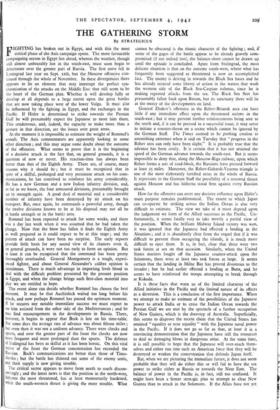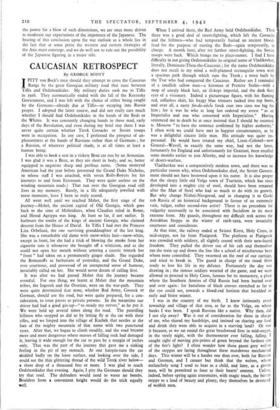THE GATHERING STORM
By STRATEGICUS FIGHTING has broken out in -Egypt, and with this the most critical phase of the Axis campaign opens. The more favourable campaigning season in Egypt lies ahead, whereas the weather, though
still almost unbearably hot in the south-east, must soon begin to deteriorate over the greater part of Russia. The first snow fell in Leningrad last year on Sept. 12th, but the Moscow offensive con- tinued through the whole of November. In these divergencies there appears to lie an element that may interrupt the perfect syn- chronisation of the attacks on the Middle East that still seem to be the heart of the German plan. Whether it will develop fully or develop at all depends to a large extent upon the great battles
that are now taking place west of the lower Volga. It must alto be influenced by the fighting in Egypt, and the exchanges in the Pacific. If Hitler is determined to strike towards the Persian Gulf he will presumably expect the Japanese to meet him there. This rendezvous, and, indeed, the capacity to make more than a gesture in that direction, are the issues over great areas.
At the moment it is impossible to estimate the weight of Rommel's assault. The Axis commentators are apparently looking in some other direction ; and this may argue some doubt about the outcome of the offensive. What seems to prove that it is the beginning of a decisive attack is the fact that, on general grounds, it is a question of now or never. His reaction-time has always been better than that of the Eighth Army. There are, of course, many reasons why it should be ; but it must be recognised that in spite of a skilful, prolonged and very persistent attack on his com- munications, he has contrived to reinforce his army considerably. He has a new German and a new Italian infantry division, and, as far as we know, the four armoured divisions, presumably brought up to strength again. A good deal of material and a considerable number of infantry have been destroyed by air attack on his transport. But, once again, he commands a powerful army, though the twelve divisions known to be at his disposal may not all be at battle strength or in the battle area.
Rommel has been expected to attack for some weeks, and there was a day last week when it was assumed that he had taken the plunge. Now that the blow has fallen it finds the Eighth Anny as well prepared as it could expect to be at this stage ; and the pattern of attack can have been no surprise. The early reports provide little basis for any sound view of its chances even if, on general grounds, it were not too early to form an opinion. But at least it can be recognised that the command has been pretty thoroughly overhauled. General Montgomery is a tough, experi- enced fighter, and about General Alexander's calibre opinion is unanimous. There is much advantage in importing fresh blood to deal with the difficult problem presented by the present position in Egypt, and when the change brings such first-class material into play we are entitled to hope.
The event alone can decide whether Rommel has chosen the best moment. It may be that Auchinleck waited too long before his attack, and now perhaps Rommel has passed the optimum moment. If he secures any notable immediate success we must expect to see him assisted from the other side of the Mediterranean ; and he may find encouragement in the developments in Russia. There, however, it begins to appear that Bock is late on his time-table. For some days the average rate of advance was about fifteen miles ; but even then it was not a uniform advance. There were checks and spurts, and over the greater part of the front the checks are now more frequent and more prolonged than the spurts. The defence of Stalingrad has been as skilful as it has been heroic. On this vital sector of the front the German concentration has exceeded the Russian. Bock's communications are better than those of Timo- shenko ; but the battle has thinned out some of the enemy units, and their supply is now giving trouble.
The critical sector appears to move from north to south discon- certingly ; and the latest news is that the position in the north-west, hitherto the most threatened, has at least momentarily hardened, While the south-western thrust is giving the more trouble. What cannot be obscured is the titanic character of the fighting ; and, if some of the gages of the battle appear to be already gravely com- promised (if not indeed lost), the balance-sheet cannot be drawn up until the episode is concluded. Apart from Stalingrad, the most delicate situation is that on the extreme south-west, where what has frequently been suggested as threatened is now an accomplished fact. The enemy is driving in towards the Black Sea bases and he has already secured some liberty of action in the waters that wash the western side of the Black Sea-Caspian isthmus, since he is making repeated attacks from the sea. The Black Sea fleet has presumably fallen back upon Batum, but its sanctuary there will lie at the mercy of the developments on land.
General Zhukov's offensive in the Rzhev-Briansk area can have little if any immediate effect upon the threatened sectors in the
south-east ; but it may prevent further reinforcements being sent to the south and, if it can be pressed to a successful issue, it may serve to initiate a counter-threat on a sector which cannot be ignored by the German Staff. The Times seemed to be pushing caution to astonishing extremes when it said on Tuesday that " progress in the Rzhev area can only have been slight." It is probably true that the advance has been costly. It is certain that it has not attained the speed of the German advance towards the south-east. But it seems impossible to deny that, along the Moscow-Riga railway, upon which Rzhev forms a sort of road-block, the Russians have pressed forward at least 25 miles. Moreover, the Rzhev-Gzhatsk-Vyazma triangle is one of the most elaborately fortified areas in the whole of Russia. It represents to the German Staff the possibility of a renewed thrust against Moscow and has hitherto stood firm against every Russian attack.
How far the offensive can exert any decisive influence upon Hitler's main purpose remains problematical. The extent to which Japan can co-operate by striking across the Indian Ocean is also very difficult to estimate. The view we take of it must depend upon the judgement we form of the Allied successes in the Pacific. Un- fortunately, it seems fatally easy to take merely a partial view of the position. When the brilliant Midway Island victory was won, it was ignored that the Japanese had effected a landing in the Aleutians ; and it is abundantly clear from the sequel that if it was difficult to prevent them occupying the islands, it is much more difficult to eject them. It is, in fact, clear that there were two task forces at sea on that occasion. Similarly, when the United States marines fought off the Japanese counter-attack upon the Solomons, there were at least two task forces at large. It seems certain that the landing in Milne Bay has proved disastrous to the invader ; but he had earlier effected a landing at Buns, and he seems to have reinforced the troops attempting to break through at Kokoda.
It is these facts that warn us of the limited character of the Allied initiative in the Pacific and the limited nature of its effects as a diversion. This is a conclusion of the first importance. When we attempt to make an estimate of the possibilities of the Japanese power to attack India or to cross the Indian Ocean towards the Persian Gulf we are met by the spectacle of a further occupation of New Guinea, which is the doorstep of Australia. Superficially, this seems to disprove the recent claim that the United States has attained " equality or near equality " with the Japanese naval power in the Pacific. If it does not go so far as that, at least it is a convincing demonstration that the Japanese have still the resources to deal us damaging blows in dangerous areas. At the same time, it is still possible to hope that the Japanese will over-reach them- selves and either run into such an American force that they will be destroyed or weaken the concentration that defends Japan itself.
But, when we are picturing the immediate future, it does not seem probable that they will do either this or will fail to have the sea power to strike either at Russia or towards the Near East. The balance of power in the Pacific is, in fact, still too confused. It might have been a firmer strategic plan to attempt to clear New Guinea than to attack in the Solomons. If the Allies have not yet the power for a blow of such dimensions, we are once more driven to moderate our expectations of the impotence of the Japanese. The bearing of this conclusion upon the war outlook as a whole lies in the fact that at some point the western and eastern strategies of the Axis must converge, and we do well not to rule out the possibility of the Japanese figuring in a major role.



























 Previous page
Previous page